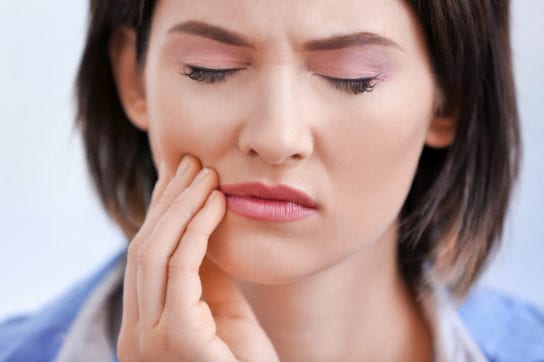
Have you ever noticed yourself grinding your teeth or clenching your jaw? Has your spouse or partner ever mentioned the sound of your teeth grinding together at night? Most people only suffer from bruxism when they sleep at night, but some unlucky souls grind and clench in the daytime, too. Some people may not even be aware that they are damaging their teeth every night while they sleep. This is unfortunate, because untreated bruxism can do a lot of harm and usually doesn’t go away on its own.
Do you suspect you grind your teeth at night when you sleep? Call our dental office to learn more about the risks of bruxism, Clinton NJ as well as possible treatments. To schedule an appointment, contact us online or call our office at 908-200-7007.
Signs and Risks of Bruxism
Some patients know for a fact that they tend to clench their jaw or grind their teeth. However, since it happens the mostly when we are fast asleep, many patients may be unaware they have a problem.
Some signs that may indicate bruxism include:
- Waking with a sore jaw
- Morning headaches in the temples
- A gritty feeling in the mouth in the morning
- Waking with your jaw firmly clenched shut
- A family member noticing the tell-tale sound of teeth grinding together
- Sensitive teeth, especially in the back of the mouth
- Worn down or cracked tooth enamel
Bruxism can threaten your oral health in some pretty significant ways. Teeth may seem very hard and resilient, but constant friction, tooth-on-tooth, can lead to structural damage. Enamel can become worn down and teeth can develop cracks that may deepen over time. It can even cause teeth to become loosened and make you more likely to develop gum disease and tooth decay.
Beyond the damage to your teeth, bruxism can cause chronic headaches and pain in the jaw. When the jaw muscles are used constantly throughout the night, fatigue and soreness may result. It can even lead people with proper bite alignment to develop symptoms of temporomandibular joint disorder (TMD).
What Causes Bruxism?
Officially, there is no clearly defined cause behind persistent grinding of the teeth and clenching of the jaw. Some people just do it, while others don’t. Some patients notice it gets worse when they are under stress, while others do it all the time.
It is theorized that temporomandibular joint (TMJ) disorder may be connected to bruxism, as many TMD sufferers also grind their teeth. When the bite is not properly aligned, the joints of the jaw do not function optimally. This can lead to stress and muscle fatigue that may cause the jaw muscles to “work overtime” when they should be resting.
It’s also been proposed that hereditary factors may play a role, since bruxism tends to be more common in some families, but not others. Some think some cases of bruxism may be rooted in a neurological disorder, as certain medications that alter one’s brain chemistry are known to cause jaw clenching and teeth grinding.
Ultimately, there’s no way to cure bruxism, but there are ways to treat it. Treatments from your dentist can help reduce the potential damage to your tooth enamel, as well as the headaches caused by jaw clenching.
How a Dentist Can Help with Bruxism, Clinton NJ
If you suspect you may be a grinder/clencher, talk to your dentist about an oral appliance for bruxism. While we can’t stop you from grinding your teeth, we can mitigate further damage to your enamel. A small customized device can be worn when you sleep to provide cushioning between the teeth and prevent further damage. If you have already sustained serious damage to your enamel, we can provide you with dental crowns to protect the and restore your teeth.
Call our office to learn more about bruxism, Clinton NJ. Dr. Victoria Uryniak or Dr. Carson Ferris-Zeolla will examine your teeth for signs of bruxism and help you understand your options for preventing further damage. Contact us online or call our office at 908-200-7007 to make an appointment.


